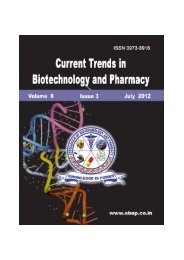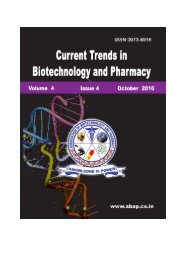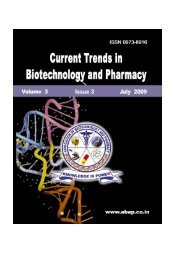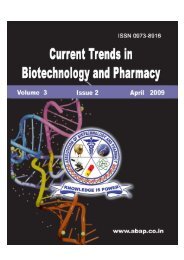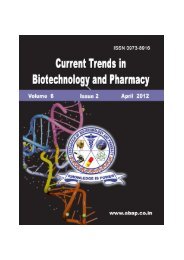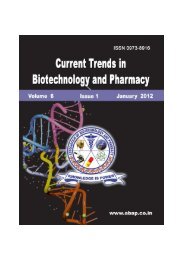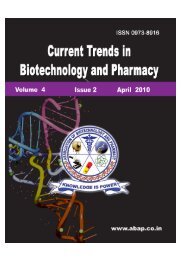full issue - Association of Biotechnology and Pharmacy
full issue - Association of Biotechnology and Pharmacy
full issue - Association of Biotechnology and Pharmacy
- No tags were found...
Create successful ePaper yourself
Turn your PDF publications into a flip-book with our unique Google optimized e-Paper software.
Current Trends in <strong>Biotechnology</strong> <strong>and</strong> <strong>Pharmacy</strong>Vol. 5 (2) 1130-1133 April 2011. ISSN 0973-8916 (Print), 2230-7303 (Online)Automated Synchronization <strong>of</strong> P. falciparum using aTemperature Cycling Incubator1130Alej<strong>and</strong>ro Almanza, 1, 2 Lorena Coronado, 1 Nicole Tayler, 1 Liuris Herrera 1, 2 <strong>and</strong>1, 2*Carmenza Spadafora1Centro de Biología Celular y Molecular de las Enfermedades (CBCME), Instituto de Investigaciones Científicas yServicios de Alta Tecnología (INDICASAT AIP), Panama.2International Cooperative Biodiversity Groups (ICBG), Smithsonian Tropical Research Institute (STRI), Panama.*For Correspondence - cspadafora@indicasat.org.paAbstractAs malaria keeps affecting millions <strong>of</strong> livesevery year, research based in culture <strong>of</strong>Plasmodium falciparum in vitro needs to beefficient <strong>and</strong> accurate. The development <strong>of</strong> bettertechniques <strong>and</strong> methodologies for the growth <strong>and</strong>maintenance <strong>of</strong> the parasites can save money,time, <strong>and</strong> lead to more trustable results. It hasbeen observed, first in patients <strong>and</strong> then in thelaboratory, that the malaria falciparum parasitesgrowth is affected by high temperatures. This traitcan be used with laboratory cultures tosynchronize <strong>and</strong> maintain the parasites in the samestage <strong>of</strong> their cell cycle. This harmony <strong>of</strong> stagesis very desirable for the purpose <strong>of</strong> conductingmetabolomic, proteomic <strong>and</strong> transcriptomeanalysis as well as for drug screening. Mostscientists in the field <strong>of</strong> malaria use chemicals(usually sorbitol) that kill certain stages <strong>of</strong> theparasite to obtain synchronization, but this lattermethod does not last long <strong>and</strong> the parasites thustreated should not be used for assays immediatelyafter the treatment, due to the toxic effects thatmight have been infringed in the culture. Atemperature cycling incubator (TCI) was acquiredin our laboratory <strong>and</strong> it was used to test thesynchronization <strong>of</strong> the multidrug resistant W2 <strong>and</strong>chloroquine resistant 7G8 strains, commonly usedin our bioassays where they <strong>and</strong> theirsynchronization constitute essential tools for ourdrug discovery program. We followed the protocoldesigned by Haynes <strong>and</strong> Moch in 2002 <strong>and</strong> wemade a comparison <strong>of</strong> the effectiveness <strong>of</strong> each<strong>of</strong> the two methods, chemical <strong>and</strong> temperaturebased. Our results show W2 synchronization bytemperature cycling, with the help <strong>of</strong> an initialuse <strong>of</strong> 0.3 M alanine, to last more than two monthswhile a tight synchronization with the use <strong>of</strong> 5%sorbitol was lost as rapidly as in one week. Sorbitolcould also be used with the TCI forsynchronization with good results. However, 7G8could not be efficiently synchronized withtemperature cycling using the same program asthat <strong>of</strong> W2.Key Words: P. falciparum, Culture,Synchronization, High temperature, TCI.IntroductionIt has been described that in vitro growth<strong>of</strong> Plasmodium falciparum is inhibited by hightemperatures (1-5) <strong>and</strong> there have beenrelationships drawn from these findings on howfever in malaria patients may influence parasitegrowth, coordination <strong>of</strong> cyclic stages, <strong>and</strong>parasitemia.In 2002, Haynes <strong>and</strong> Moch published amethod for using these observations tosynchronize P. falciparum cultures for laboratoryAutomated Synchronization <strong>of</strong> P. falciparum



